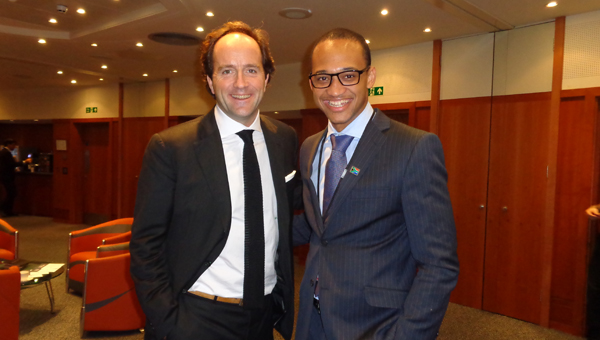Ambassador from South Africa, Monde Nkosi, on Sub-Saharan African economic growth story following the World Forum on Natural Capital.
Follow Monde on Twitter: @monde-nk
[[[image-0 native]]]
The inaugural World Forum on Natural Capital was recently held in Edinburgh, Scotland. I was privileged to be one of the speakers at the event, alongside One Young World Co-Founder David Jones. My presentation focused on the extremely urgent need to address the superficial manner in which we’re viewing Sub-Saharan African growth. Even in countries with positive GDP numbers, there are instances where we are depleting the stock of wealth in our countries to an extent that it will be significantly harder for today’s children to experience the same of quality of life that we currently do. In a region in which the median age is 19 and 400 million people are below the age of 14, this is a ticking time bomb – we need to urgently change the dialogue.
[[[image-1 native]]]
Africa Rising
The Economist has said it. Time Magazine has said it. All over the world we are seeing and hearing about the Sub-Saharan African economic growth success story. Foreign Direct Investment has gone from $15 Billion in 2002 to $46 Billion in 2012. Compared to global GDP growth of 2.2% in 2012, Angola grew at 6.8%, the Democratic Republic of the Congo at 9.5%, Burkina Faso at 10% and the list continues. And this is only the beginning. Over the next decade the continent’s GDP is expected to rise by an average of 6% per year.
It’s not that simple
The problem is that GDP only looks at one aspect of economic performance: income. It doesn’t account for the assets which make the income possible, and therefore says nothing about how sustainable the growth is. For instance, when we deplete our mineral resources, we recognise that as income in our national accounts but don’t recognise the loss of that mineral asset. Future generations will not be able to mine that same mineral to fund their lives. This may be justifiable if we are investing the money from the resources into educating our people and diversifying our economies – it is only then that the growth would be sustainable.
As it is, the World Bank calculates the Adjusted Net Savings (ANS) metric which adjusts national savings downward for the depletion of natural resources and, importantly, upwards for spending on education. When it is negative, it implies that the stock of wealth of a country is in decline, meaning future generations will struggle to enjoy the same quality of life that we currently do. For Sub-Saharan Africa the ANS has been on a clearly downward trend in the last two decades. In the last year with reliable estimates, 2008, the ANS of the DRC was -2.49%, Equatorial Guinea -38.45%, Angola -42.63% and Chad -49.89%.
Another big issue is that we are not correctly valuing the products we sell. For example, the price for which we sell timber does not account for the loss of carbon sequestration and water filtration services. Without the forest, businesses and municipalities in the future will have to pay for those services.
Taking an example from South America, deforestation and harmful farming practices have resulted in a significant increase in the cost of water filtration required in Bogota. The estimates for the differential cost are upwards of $3.5 million per annum. We need to factor in these costs upfront when we decide to sell the product.
It’s time for us to wake up
Companies and governments around the world are waking up to these facts. SAB Miller has invested $240,000 in Bogota to preserve natural capital, resulting in an annual saving of $3.5 million in water filtration costs. Of this saving, $458,000 accrues directly to SAB Miller, whilst the remainder is saved by the municipality. Unilever has taken the lead in protecting forests in the Kericho district of Kenya in order to preserve the water quality and crop productivity for their tea plantations. At a government level, the WAVES program has been rolled out in Botswana and Rwanda. Several other African countries feature in the next phase of the rollout.
The problem is that it’s still nowhere near enough. In a survey of young professionals in Sub-Saharan Africa, 78% had never heard of the term Natural Capital and 98% had never contributed to any Natural Capital valuation initiative of any kind. Unless we bring Natural Capital into the mainstream, our governments will continue to make the wrong policy decisions, our businesses will continue to undervalue our products and we will continue to look at our development at a superficial level.
Watch this space
As we leave the World Forum on Natural Capital and head back to our respective countries, we commit to bringing Natural Capital into the mainstream debate, especially in Sub-Saharan Africa. To join us in this mission, please get in touch with us by sending an email to info@ypan.org. Experts and non-experts alike, we all have a role to play in bringing the message to our government departments, to our companies and to our schools or universities.

